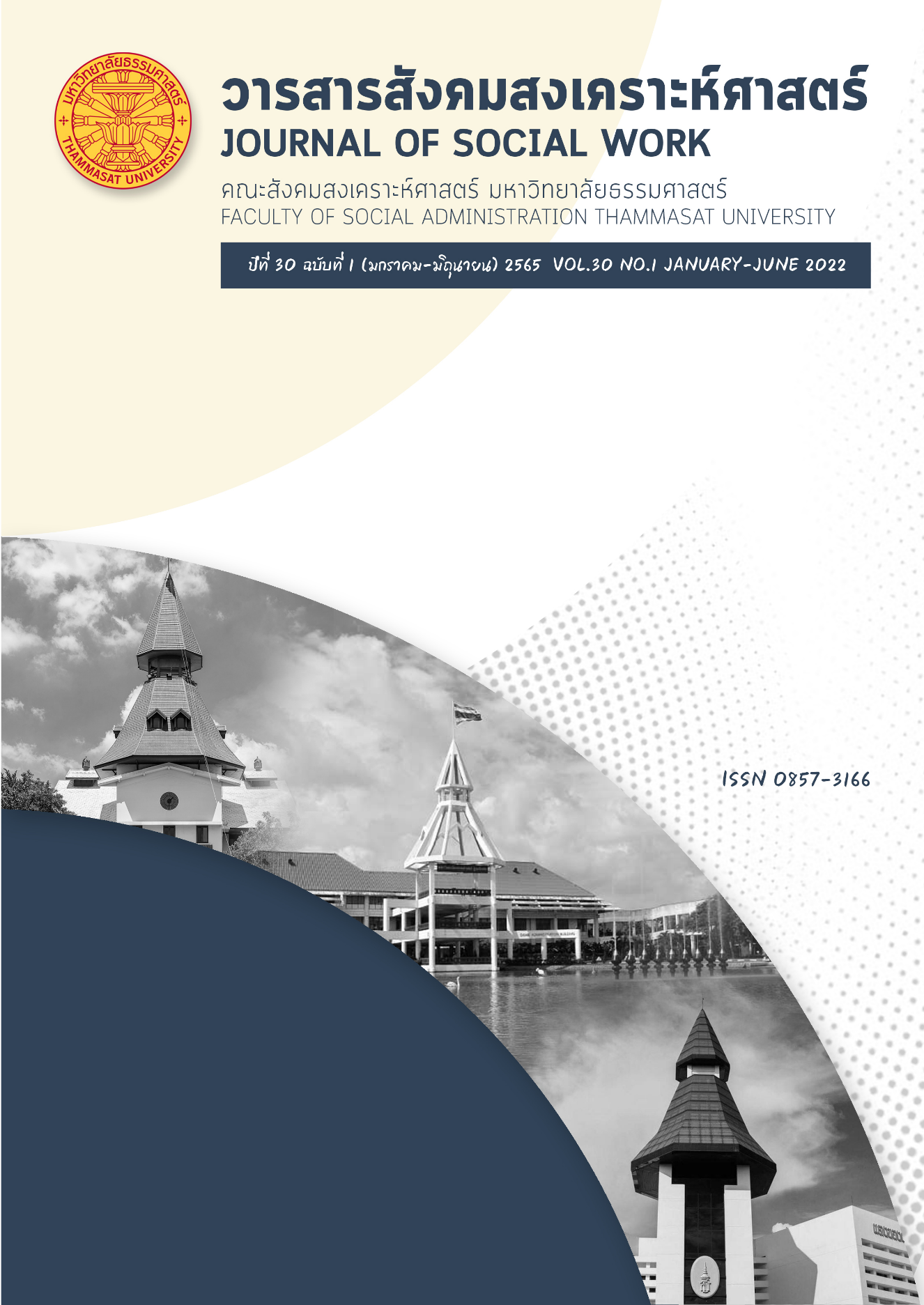The Disappearance of Human-Ghost Relationship from Medical Social Work Education under Biomedicine in Thai Context
Keywords:
Medical Social Work, Humanism, Human-Ghost relationshipAbstract
This article arises from an interest in Actor-Network Theory introduced in the late 20th century. Differing from medical social work that originated with a hospital context in the early 20th century, the theory attempts to create a new analysis framework beyond a human-centered viewpoint. Thinking and practicing with the theory requires modern medical frameworks, so-called Biomedicine and Humanism, which completely dissociate humans from an influence of supernatural power and perceive humans as the only actors in the scenario, resulting in restricted working conditions in social work instead of generally emphasizing social and cultural dimension. Other non-scientific knowledge is consequently ignored and excluded from education while the exploitation of supernatural power by medical social workers is mentioned in foreign countries. The author therefore proposes the substantial necessity of arranging an alternative educational instruction and of defining the role of the non-human actor in human life surrounded by culture and technology to actually provide service to people in every extensive dimension.
References
กิติพัฒน์ นนทปัทมะดุลย์. (2562). บทวิจารณ์หนังสือ Handbook of health Social Work. วารสารสังคมสงเคราะห์ศาสตร์, 27(2), 228-253.
โกมาตร จึงเสถียรทรัพย์. (2559). ศาสตร์-อศาสตร์: มานุษยวิทยา ณ จุดเปลี่ยนทางภววิทยา. ใน จันทนี เจริญศรี (บ.ก.), ศาสตร์-อศาสตร์. (น. 116-141). กรุงเทพฯ: ภาพพิมพ์.
ซือจิ้ง. (2546). การแพทย์จีนในศตวรรษที่ 21. วารสารการแพทย์แผนไทยและแพทย์ทางเลือก, 1(1), 91-93.
ทวีศักดิ์ เผือกสม. (2561). เชื้อโรค ร่างกาย และรัฐเวชกรรม ประวัติศาสตร์การแพทย์สมัยใหม่ในสังคมไทย. (พิมพ์ครั้งที่ 2). กรุงเทพฯ: ภาพพิมพ์.
ธวัช มณีผ่อง. (ม.ป.ป.) ความรู้ชายขอบ ความรู้ที่ถูกกดทับ. สืบค้นจาก http://www.shi.or.th/download/category/10/1/
ปรียานุช โชคธนวณิชย์. (2563). รูปแบบการบำบัดในงานสังคมสงเคราะห์คลินิกและแนวทางการพัฒนา. วารสารสังคมสงเคราะห์ศาสตร์, 28(1), 117-152.
พระไพศาล วิสาโล และคณะ (2550). ใน โกมาตร จึงเสถียรทรัพย์, วรพงษ์
เวชมาลีนนท์, นงลักษณ์ ตรงศีลสัตย์, ชาติชาย มุกสง และ วรัญญา
เพ็ชรคง (บ.ก.), สันติ-สุขภาวะ สันติวิธีกับการจัดการความขัดแย้งในระบบสุขภาพ. นนทบุรี: สำนักวิจัยสังคมและสุขภาพ.
พึงเนตร สฤษธิ์นิรันดร์ และ อาคม อารยาวิชานนท์. (2563). สมาธิบำบัดทางการแพทย์. วารสารสรรพสิทธิเวชสาร, 41(1), 29-40.
ภัทรลดา ทองเถาว์ และ สุวัตนา เลี่ยมประวัติ. (2563). บทบาทความเชื่อเรื่องผีต่อสังคมอีสาน กรณีศึกษาจังหวัดอุบลราชธานี. วารสารศิลปศาสตร์ มหาวิทยาลัยรังสิต, 15(2), 221-236.
ภิกษุณีนตนธมมเจตนา (ธัมมเมธา). (2561). การอธิบายตีความตัณหาด้วยหลักเทศนาหาระ. วารสารปรัชญาปริทรรศน์, 23(2), 1-9.
ยกศักดิ์ ตันติปิฎก. (ม.ป.ป.). ปรากฎการณ์แพทย์ทางเลือก พหุลักษณ์ทางการแพทย์ในยุคสมัยใหม่. สืบค้นจาก http://www.shi.or.th/download/category /10/1/
วสันต์ ปัญญาแก้ว. (2564). มานุษยวิทยาไซบอร์กว่าด้วยการศึกษาความสัมพันธ์ระหว่างมนุษย์ เครื่องจักรและสมองกล. ศูนย์มานุษยวิทยาสิรินธร. สืบค้นจาก. https://youtu.be/kAQK_6j5E38
วัชราภรณ์ คำแสน และ มาดี ลิ่มสกุล. (2564). บทบาทของนักสังคมสงเคราะห์ในการสนับสนุนทางสังคมต่อผู้ป่วยมะเร็งเต้านม. วารสารสังคมสงเคราะห์ศาสตร์, 29(1), 29-67.
สามารถ ใจเตี้ย และ วรางคณา สินธุยา. (2562). ผีล้านนามิติสร้างเสริมสุขภาพชุมชน. วารสารวิจัยราชภัฏพระนครสาขาวิทยาศาสตร์และเทคโนโลยี, 14(2), 162-169.
สุรเดช โชติอุดมพันธ์. (2562). นววิถี: วิธีวิทยาร่วมสมัยในการศึกษาวรรณกรรม. กรุงเทพฯ: สำนักพิมพ์สยามปริทัศน์ จำกัด.
Beder, J. (2006). Hospital Social Work: The Interface of Medicine and Caring. New York: Taylor & Francis Group.
Copson, A. (2015). What is Humanism: The Wiley Blackwell Handbook of Humanism. New York: John Wiley & Sons, Ltd.
Donovan, K. P. (2014). ‘Development’ as if We Have Never Been Modern: Fragments of a Latourian Development Studies. Development and Chand, 45(5), 869-894.
Hassan, S.M. (2016). Medical Social Work: Connotation, Challenges, and prospects. Pakistan Journal of Social Sciences, 36(1), 495-504.
Nguyen, H. (2014). Buddhism-Based Exorcism and Spirit-Calling as a Form of Healing for mental Health problems: Stories from Vietnam. Journal of Religion & Spirituality in Social Work: Social Thought, 33, 33-48.
Payne, M. (2011). Humanistic Social Work. Retrieved from http://global. oup.com/us/companion.websites/fdscontent/uscompanion/us/static /companion.websites/9780190615246/C10_Final_Human.doc
Puchalski, C. M., Vitillo, R., Hull, S. K., & Reller, N. (2014). Improving the Spiritual Dimension of Whole Person Care: Reaching National and International Consensus. Journal of Palliative Medicine, 17(6), 642-656.
Rebuya, N. R., Lasarte, E. S., & Amador, M. M. A. (2020). Medical Pluralism, Traditional Healing Practices, and the Partido Albularyo: Challenge in Inclusion. Open Journal of Social Sciences, 8, 72-79.
Resnick, S., Arthur., W., & Serlin, I. (2001). The Humanistic Psychology and Positive Psychology Connection: Implications for Psychotherapy. Journal of Humanistic Psychology-Journal of Humanistic Psychotherapy, 41, 73-101.
Downloads
Published
How to Cite
Issue
Section
License
Copyright (c) 2022 Journal of Social Work

This work is licensed under a Creative Commons Attribution-NonCommercial-NoDerivatives 4.0 International License.
The manuscripts published in the Social Work Journal is the copyright of the Social Work Journal, Thammasat University
Any article or opinion appeared in the Social Work Journal will solely be under the responsibility of the author The Faculty of Social Administration, Thammasat University and the editors do not need to reach in agreement or hold any responsibility.



